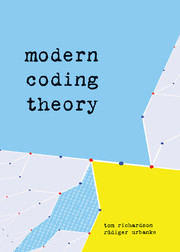Book contents
- Frontmatter
- Contents
- PREFACE
- 1 INTRODUCTION
- 2 FACTOR GRAPHS
- 3 BINARY ERASURE CHANNEL
- 4 BINARY MEMORYLESS SYMMETRIC CHANNELS
- 5 GENERAL CHANNELS
- 6 TURBO CODES
- 7 GENERAL ENSEMBLES
- 8 EXPANDER CODES AND FLIPPING ALGORITHM
- A ENCODING LOW-DENSITY PARITY-CHECK CODES
- B EFFICIENT IMPLEMENTATION OF DENSITY EVOLUTION
- C CONCENTRATION INEQUALITIES
- D FORMAL POWER SUMS
- E CONVEXITY, DEGRADATION, AND STABILITY
- Authors
- Index
B - EFFICIENT IMPLEMENTATION OF DENSITY EVOLUTION
Published online by Cambridge University Press: 05 September 2012
- Frontmatter
- Contents
- PREFACE
- 1 INTRODUCTION
- 2 FACTOR GRAPHS
- 3 BINARY ERASURE CHANNEL
- 4 BINARY MEMORYLESS SYMMETRIC CHANNELS
- 5 GENERAL CHANNELS
- 6 TURBO CODES
- 7 GENERAL ENSEMBLES
- 8 EXPANDER CODES AND FLIPPING ALGORITHM
- A ENCODING LOW-DENSITY PARITY-CHECK CODES
- B EFFICIENT IMPLEMENTATION OF DENSITY EVOLUTION
- C CONCENTRATION INEQUALITIES
- D FORMAL POWER SUMS
- E CONVEXITY, DEGRADATION, AND STABILITY
- Authors
- Index
Summary
Density evolution plays a fundamental role in the analysis of iterative systems; it is also a valuable tool in the design of such systems. Actual computation of density evolution for low-density parity-check (LDPC) codes requires an algorithmic implementation. Finding an efficient such implementation is a challenging problem. In this section we show how this can be done.
When implementing density evolution one may or may not assume symmetry of the densities. Working directly in the space of symmetric distributions yields the most efficient implementations. The interaction of the symmetry with the practical constraints of finite support typically leads to optimistic predictions of the thresh-old. On the other hand, sometimes one is interested specifically in consequences of non-symmetry. Moreover, by allowing densities to be non-symmetric one can compute density evolution for a message-passing decoder which corresponds to a quantized version of belief propagation. Since belief propagation is optimal, thresholds computed this way are lower bounds on the true belief propagation threshold. We will not assume strict symmetry in general, but we will assume that densities are “nearly” symmetric.
We use the notation * to denote standard convolution over ℝ, ℤ, or ℤ/N ℤ – the ring of integers modulo N. Variable-node domain convolution, which we have denoted by *, is standard convolution but we shall use ⊛ to emphasize computational aspects.
- Type
- Chapter
- Information
- Modern Coding Theory , pp. 459 - 478Publisher: Cambridge University PressPrint publication year: 2008
- 1
- Cited by



